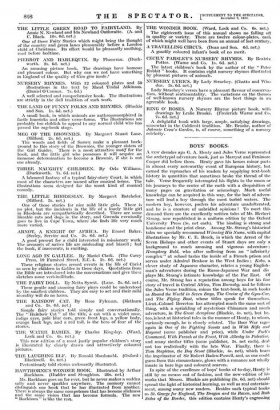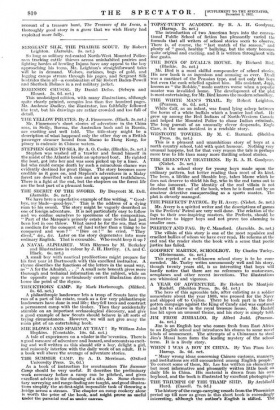BOYS' BOOKS.
A FEW decades ago G. A. Henty and Jules Verne represented the archetypal adventure book, just as Marryat and Fenimore Cooper did before them. Henty gave his heroes minor parts in almost every noteworthy event of European history, but earned the reproaches of his readers by supplying text-book history in quantities that sometimes broke the thread of the tale. Verne frequently interrupted his flights to the moon or his journeys to the centre of the earth with a disquisition of many pages on gravitation or seismology. Much useful knowledge can be acquired in this way, for the bait of adven- ture will lead a boy through the most turbid waters. The modem boy, however, prefers his adventure unadulterated, and he is a creature of unbridled opinions ! To meet this demand there are the excellently written tales of Mr. Herbert Strang, now republished in a uniform edition by the Oxford University Press (5s. net each). The binding is strong and handsome and the print clear. Among Mr. Strang's historical tales we specially recommend Winning His Name, with capital illustrations by Mr. C. E. Brock, in which the Arrest of the Seven Bishops and other events of Stuart days are only a background to much amusing and vigorous adventure ; Humphrey Bold, who after suffering from an "inferiority complex" at school tastes the inside of a French prison and serves under Admiral Benbow in the West Indies ; Kobo, a clever study of Japanese character, relates a young English- man's adventures during the Russo-Japanese War and dis plays Mr. Strang's intimate knowledge of the Far East. Of course, Mr. Strang has a reputation among boys for his fine story of travel in Central Africa, Tom Burnaby, and he follows the Jules Verne tradition, minus the text-book, in such books as Round the World in Sewn Days, The Cruise of the Gyro-Car, and The Flying Boat, whose titles speak for themselves. Lieut.-Colonel 13rereton has attempted much the same sort of thing, with a sprinkling of mysteriotts Chinamen and much adventure, in The Great Aeroplane (Blackie, 4s. net), but he, too, is best at historical tales in the manner of Henty, to whom, curiously enough, he is closely related. The Boer War rages again in One of the Fighting Scouts and in With Rifle and Bayonet (same publisher and price), while Under Foch's Command, With French at the Front, With Allenby in Palestine, and many similar titles (same publisher, 5s. net each), deal not too realistically with the late War. Finally, there is Tom Stapleton, the Boy Scout (Blackie, 46. net), which bears the imprimatur of Sir Robert Baden-Powell, and, as one could guess from this circumstance, glows with a romance not wholly innate in bare legs and coloured scarves.
In spite of the excellence of boys' books of to-day, Henty is still by no means out of fashion, and the new-edition of his works that Messrs. Mackie are publishing (3s. 6d. net) should spread the light of historical learning, as well as real entertain- ment, among many new readers. Besides such typical books as St. George for England, The Dragon and the Raven, and Both Sides of the Border, this edition contains Henty's engrossing
account of a treasure hunt, The Treasure of the Incas, a thoroughly good story in a genre that we wish Henty had exploited more fully.







































































 Previous page
Previous page